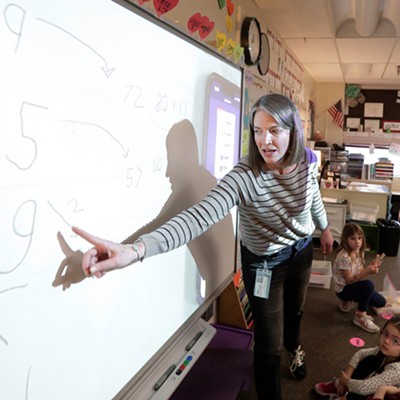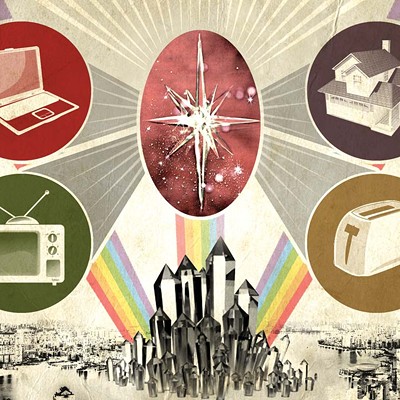Say you’re shopping for a new television. If you’re like some people, you can’t help yourself. You can’t just show up at Best Buy on a whim and walk out with a set you like. You research this decision for weeks.
You study Consumer Reports, learn everything you can. And then, as soon as you get your new TV home and you eeeeease back into your favorite recliner, you get a gnawing feeling: Was this the best TV you could’ve bought? Are there better ones out there?
Researchers in behavioral economics long ago developed a name for this phenomenon: buyer’s remorse. But until the last few years, nobody had thought to take this kind of research out of the box store and into the bedroom.
Alan Mikkelson, an associate professor at Whitworth University who studies interpersonal communication, says the thought first occurred to him as a grad student at Arizona State University, when he read The Paradox of Choice, by behavioral economist Barry Schwartz.
“One of the things he talks about is the idea of maximization,” he says. “On [one] end, you have maximizers, who want to make the best choice possible. Not just a good choice — the best choice. The people on the other end he calls satisficers, which are people who have a certain standard for the choice they make, and once they find something that meets that standard, they accept it, and they’re satisfied with it.”
He points to studies showing that maximizers tend to get better jobs than satisficers, but that they tend to be less satisfied with those jobs because they believe better options exist.
“So, I thought, this is an interesting idea,” he recalls. “People make choices about who they date, who they marry. I wonder how this affects relationships.”
Mikkelson conducted two different studies in the last three years, each a survey of about 300 college-age students in Arizona and California who reported that they were in dating relationships. Participants were asked to rank hundreds of prompts and questions on a scale of 1 to 9, according to how much they disagreed or agreed.
A few of those prompts:
|
“I feel satisfied with our relationship.” |
1 2 3 4 5 6 7 8 9 |
|
“If I weren’t dating my partner, I would do fine — I would find another appealing person to date.” |
1 2 3 4 5 6 7 8 9 |
|
“I want our relationship to last forever.” |
1 2 3 4 5 6 7 8 9 |
|
“I have very specific qualities that I look for in another person." |
1 2 3 4 5 6 7 8 9 |
|
“I often find it difficult to shop for a gift for a friend." |
1 2 3 4 5 6 7 8 9 |
His findings? People who scored high for maximization were 46 percent more likely to seek alternatives in their relationships than those in the bottom quarter on the maximization scale. And the latter reported being 15 percent more satisfied, 18 percent more invested and 33 percent more committed in their relationships.
“My hunch is that maximizers can quietly sabotage their own relationships because they don’t fully invest in them,” he says, “or don’t give themselves fully to the other.”
Of course, he wasn’t surprised.
Mikkelson, who attended Whitworth as an undergrad, remembers a guy who lived in his dorm.
“It sounds horrible to say, but he really wasn’t very impressive. He wasn’t a great student. Wasn’t a great athlete. He was a really nice guy, and he was really good at playing the guitar and singing, which at Whitworth actually is like having gold in your pocket,” he says. “But he was dating this young woman that was just amazing. Great student, beautiful, good athlete, was on the track team. Just a sweetheart. And I remember talking to him once, and he was, like, ‘Yeah, I don’t know, I just wonder if there’s something better out there for me.’ And I couldn’t believe it! You’re dating the girl on campus that everyone would want to be with! And here you are thinking the grass is greener somewhere else. That’s classic maximization.”
Mikkelson’s research has been provisionally accepted for publication in the journal Personal Relationships (it receives its second review this summer). In the meantime, he’s begun looking at how maximization affects communication behavior, and he’s also started collecting data from married people.
He hasn’t even touched social networking yet, though, he says. How might the profusion of thousands of relationship alternatives online relate to his research on maximization and commitment?
“That’s [the thing] about research,” he says. “Usually, you answer one or two questions and you end up with ten more. What about this? What about this?”
Sounds like someone needs to make a decision.





















